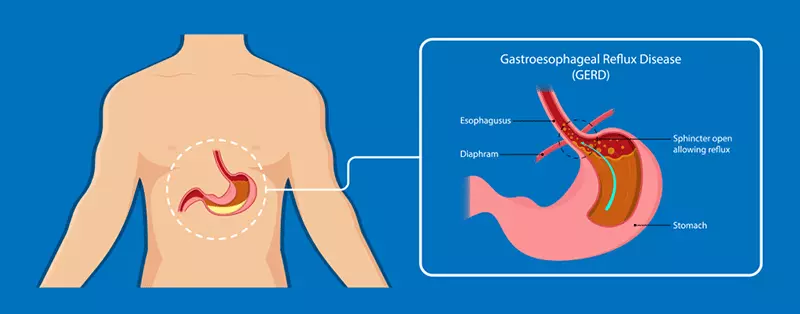Snoring and Acid Reflux: Exploring the Connection and Effective Treatment
Sep 7th 2023

Behold the symphony of sleep: snoring! It’s disruptive, it’s notoriously annoying, and, surprise—it could be a sign of something more than just sound. Did you know that chronic snoring is often linked to Acid Reflux, a condition causing discomfort and potential health risks? Here at Zyppah, our goal is not just to silence your nightly concerts but also to improve your overall well-being. So, strap in as we delve deep into the heart—rather throat—of the matter, decoding the mystery behind the connection between snoring and acid reflux, as well as exploring effective treatments for these seemingly innocuous but potentially dangerous bedtime invaders.
Snoring can be a symptom of acid reflux, as the relaxation of the esophageal sphincter can allow stomach acid to reach the soft palate and cause inflammation that constricts breathing during sleep. Additionally, acid reflux is often worse at night due to lying flat horizontally, allowing easier reflux, and lack of swallowing which helps neutralize acid in the esophagus. It is important to address both snoring and acid reflux to improve quality of sleep and overall health.
The Link Between Snoring and Acid Reflux

Snoring and acid reflux may seem like two unrelated issues, but numerous studies and anecdotal evidence suggest a significant connection between the two. Understanding this link is crucial for effectively addressing both conditions.
When we sleep, our muscles relax, including those in the throat. For individuals with acid reflux, this relaxation can lead to the backward flow of stomach acid into the esophagus, causing irritation and leading to a burning sensation known as heartburn. However, it doesn’t stop there - the esophageal sphincter, which is responsible for sealing off the esophagus from the stomach, doesn’;t always close tightly in people with GERD (Gastroesophageal Reflux Disease). As a result, stomach acid can travel even further up to the soft palate, causing swelling that constricts the airway. This constriction makes breathing difficult during sleep and often leads to snoring.
Imagine Susan, an individual who frequently experiences acid reflux. During sleep, when her muscles relax and her esophageal sphincter isn't completely sealed, stomach acid travels up to her soft palate. This causes inflammation, making her airway narrow and resulting in snoring sounds throughout the night.
Additionally, certain lifestyle factors can exacerbate both snoring and acid reflux. Obesity and excess weight can increase the likelihood of snoring due to additional pressure on the airways. Similarly, extra body weight can put more pressure on the stomach, leading to higher chances of acid reflux.
It’s important to note that while snoring can be a symptom of acid reflux, not everyone who snores has acid reflux and vice versa. However, if you frequently experience both symptoms simultaneously or suspect a connection between them based on your own experiences, it’s worth exploring potential strategies for managing both conditions effectively.
Now that we understand the link between snoring and acid reflux, lets explore the shared symptoms of these two conditions.
Shared Symptoms of Both Conditions

Snoring and acid reflux often share similar symptoms, further indicating their connection. These shared symptoms can include:
-
Nighttime disturbances: Both snoring and acid reflux can disrupt sleep and cause frequent awakenings throughout the night. This can lead to daytime drowsiness, fatigue, and decreased overall well-being.
-
Morning sore throat: Waking up with a sore throat is a common complaint for individuals who snore or experience acid reflux during sleep. The irritation caused by gastric acids in the esophagus or the vibration of the airways during snoring can lead to discomfort in the morning.
-
Sleep-disordered breathing: Snoring is a classic sign of sleep-disordered breathing, which includes conditions such as obstructive sleep apnea (OSA). During OSA episodes, the airway becomes partially or completely blocked, leading to pauses in breathing and potentially causing severe health issues if left untreated.
-
Interrupted sleep patterns: Snoring and acid reflux can disrupt normal sleep patterns, leaving individuals feeling restless and fatigued even after a full night’s sleep. This interrupted sleep can impact daily functioning, concentration, and overall quality of life.
While these symptoms are not exclusive to snoring or acid reflux alone, experiencing them together should prompt closer examination and consideration for appropriate management strategies.
Lets take the case of John, who frequently wakes up feeling tired with a persistent sore throat. He also experiences interrupted sleep due to snoring sounds throughout the night. Recognizing the shared symptoms between snoring and acid reflux, John decides to consult with a healthcare professional for accurate diagnosis and treatment options.
- Snoring and acid reflux have shared symptoms that can disrupt sleep, cause daytime fatigue, lead to sleep-disordered breathing, and affect overall well-being. Individuals who experience these symptoms together should consider seeking medical attention for accurate diagnosis and management strategies.
Understanding Acid Reflux

To understand the connection between snoring and acid reflux, it’s crucial to grasp the basics of acid reflux itself. Acid reflux, also known as Gastroesophageal Reflux Disease (GERD), occurs when stomach acid flows back into the esophagus and causes irritation and a burning sensation in the chest. The main cause of acid reflux is a weakness or malfunctioning of the lower esophageal sphincter (LES), a ring of muscles that act as a valve between the esophagus and stomach. When this valve doesn’t close tightly, it allows stomach acid to travel back up to the soft palate, causing swelling that constricts the airway and makes breathing difficult during sleep.
It is important to note that acid reflux is often worse at night due to several factors. First, there tends to be a higher concentration of stomach acid during nighttime hours. Additionally, lying flat horizontally facilitates easier reflux, and the lack of swallowing, which helps neutralize acid in the esophagus, exacerbates the issue.
For instance, imagine someone with untreated acid reflux who decides to lie flat on their back while sleeping. As they sleep, stomach acid can easily travel up through the weak LES and irritate both the esophagus and airways.
It’s also worth mentioning that certain lifestyle choices can contribute to acid reflux. Avoiding trigger foods like alcohol, spicy and fatty foods, citrus fruits, tomatoes, and caffeinated drinks can help reduce symptoms. Other helpful approaches include eating smaller meals, chewing food thoroughly, and waiting at least three hours after eating before lying down.
By understanding the underlying mechanisms of acid reflux and how it can cause irritation in the airways during sleep, we can begin exploring its relationship with snoring more effectively.
Triggers and How They Influence Snoring

Snoring is a common condition that affects both the snorer and their sleep partner. While there are various factors that contribute to snoring, acid reflux has been recognized as a potential trigger due to its influence on the airway.
When stomach acid travels up to the soft palate and causes swelling, it constricts the airway, making it more difficult for air to flow freely during sleep. This constriction leads to turbulent airflow, resulting in vibrations of the tissues in the throat and mouth, which produce the characteristic sound of snoring.
Moreover, individuals with acid reflux often experience an increase in mucus production. This excess mucus can further obstruct the airways and contribute to snoring.
Picture someone who suffers from both acid reflux and snores. During sleep, as stomach acid reaches the soft palate, it causes swelling and narrows the airway. The narrowed passage disrupts the smooth flow of air, leading to vibrations in the tissues of the throat and producing loud snoring sounds.
It’s important to note that not everyone who experiences acid reflux will develop snoring issues, and not all snorers have acid reflux. However, when these two conditions coexist, they can exacerbate each other and create a cycle of disrupted sleep.
Understanding how acid reflux triggers inflammation and constriction in the airways helps shed light on why individuals with this condition are prone to snoring. By addressing both conditions simultaneously, it is possible to find effective solutions for better quality sleep.
- A study published in Chest Journal found that approximately 25% of patients with habitual snoring also suffered from nighttime heartburn, suggesting a potential link between snoring and gastroesophageal reflux disease (GERD).
- According to research from the American Journal of Medicine, people with GERD are 2.5 times more likely to experience sleep apnea, a disorder frequently characterized by loud snoring.
- Research from the Sleep Disorders Centre at Monash Medical Centre in Melbourne found that people who have sleep disorders including snores are nearly twice as likely to also suffer from gastroesophageal reflux symptoms.
Treatment Options for Acid Reflux and Snoring

Snoring and acid reflux can disrupt sleep patterns, affect overall well-being, and potentially lead to more severe health issues. Understanding the treatment options available for both conditions is crucial in managing these symptoms effectively. Let’s explore some of the common approaches:
The first line of defense against acid reflux and snoring often involves medication and lifestyle adjustments. These initial steps aim to alleviate symptoms and reduce their impact on daily life.
Medication
Many over-the-counter medications, such as antacids or proton pump inhibitors (PPIs), are readily available for individuals experiencing acid reflux. Antacids work by neutralizing stomach acid, providing short-term relief. PPIs, on the other hand, reduce the production of stomach acid over a longer duration, offering more sustained symptom control.
However, it is essential to consult with a healthcare professional before starting any medication. They can evaluate your specific situation, consider potential interactions or side effects, and recommend appropriate options tailored to your needs.
Lifestyle Adjustments
In addition to medication, certain lifestyle adjustments can contribute significantly to managing acid reflux and snoring:
1. Dietary Modifications: Avoiding trigger foods such as spicy or fatty meals, caffeine, chocolate, citrus fruits, and carbonated beverages can help minimize acid reflux symptoms. Taking smaller bites, chewing thoroughly, and eating slowly can also make a difference.
2. Weight Management: Obesity is closely associated with both snoring and acid reflux. Engaging in regular exercise and maintaining a healthy weight can reduce the severity of these conditions.
3. Sleep Position: Elevating the head of your bed by using an adjustable bed frame or adding extra pillows may prevent stomach acid from flowing back into the esophagus while you sleep and decrease snoring episodes.
4. Smoking Cessation: Quitting smoking not only improves overall health but also helps reduce acid reflux and snoring.
5. Stress Reduction: Incorporating stress-reducing activities into your routine, such as regular exercise, meditation, or engaging in hobbies, can positively impact both acid reflux and snoring.
It is important to remember that these lifestyle adjustments might not eliminate the conditions entirely but can significantly improve symptoms and enhance overall well-being.
While medication and lifestyle changes are effective for many individuals, some cases may require additional intervention. In the next section, we will explore alternative treatment options for acid reflux and snoring.
Medication and Lifestyle Adjustments

Imagine John’s journey in managing his acid reflux and snoring. He started by incorporating dietary modifications such as avoiding trigger foods and eating smaller portions. Alongside these changes, he also took over-the-counter antacids to alleviate heartburn symptoms. However, John soon realized that his symptoms persisted despite these efforts.
In cases where medication and lifestyle adjustments do not provide sufficient relief, medical professionals may recommend alternative treatments such as oral appliances, continuous positive airway pressure (CPAP) therapy, or even surgery for severe cases.
- Sarah, a chronic snorer with underlying sleep apnea caused by an obstructed airway, found solace in using an oral appliance recommended by her dentist. This device repositioned her jaw during sleep, helping to keep her airway open and reducing both snoring and acid reflux episodes.
Depending on the severity of the condition and individual circumstances, healthcare providers will determine which treatment option is most suitable. They will consider factors such as underlying health conditions, personal preferences, and potential risks associated with each intervention.
It is crucial to work closely with healthcare professionals to find the most effective treatment plan tailored to individual needs. Regular follow-up appointments will allow adjustments to be made as necessary to ensure optimal symptom control and long-term management.
Living with Snoring and Acid Reflux

Living with both snoring and acid reflux can be incredibly challenging, as both conditions often disrupt your sleep and overall well-being. Snoring is not only bothersome to your partner but can also affect the quality of your own sleep, leading to daytime fatigue and decreased productivity. On the other hand, acid reflux can cause discomfort, a burning sensation in the chest, and even difficulty swallowing.
Imagine trying to get a good night rest while constantly waking up due to your own snoring or experiencing that uncomfortable feeling of acid rising up into your throat. These conditions can have a significant impact on your daily life, leaving you feeling exhausted, irritable, and frustrated.
It’s important to note that snoring and acid reflux are often interconnected. The relaxation of muscles during sleep can cause the lower esophageal sphincter (LES) to open, allowing stomach acid to flow back up into the esophagus. This acid irritation can lead to inflammation and swelling in the soft tissues of the airway, contributing to snoring.
To manage these conditions effectively, it’s crucial to explore treatment options that address both issues simultaneously. By seeking appropriate solutions, you can significantly improve your sleep quality and overall health.
Tips for Sleep Hygiene and Diet

When it comes to managing snoring and acid reflux, incorporating healthy sleep habits and making dietary adjustments can make a world of difference. Here are some tips:
1. Elevate Your Head: Raising the head of your bed by 6-8 inches using blocks or a wedge pillow can help prevent stomach acid from flowing back up into your throat while you sleep.
2. Avoid Trigger Foods: Certain foods are known to exacerbate acid reflux symptoms. These may include spicy foods, citrus fruits, tomatoes, caffeinated drinks, and fatty or fried foods. Limiting or avoiding these trigger foods altogether can help reduce acid reflux episodes.
3. Adopt a Healthy Diet: Opt for a balanced diet that includes plenty of fruits, vegetables, lean proteins, and whole grains. This can help maintain a healthy weight and minimize the risk of both snoring and acid reflux.
4. Practice Good Sleep Hygiene: Establish a regular sleep schedule, prioritize getting an adequate amount of sleep each night, and create a comfortable sleep environment free from distractions. Avoiding electronics before bed and engaging in relaxing activities can also promote better sleep.
5. Maintain a Healthy Weight: Excess weight can contribute to both snoring and acid reflux. By adopting a healthy lifestyle that includes regular exercise and proper nutrition, you can work towards achieving and maintaining a healthy weight, which may alleviate symptoms.
Implementing these lifestyle changes can be challenging at first, but taking small steps towards incorporating them into your daily routine can lead to significant improvements in managing both snoring and acid reflux.
